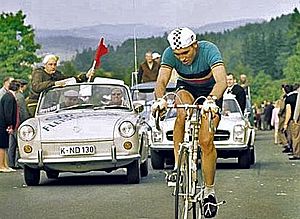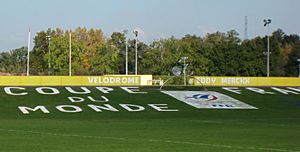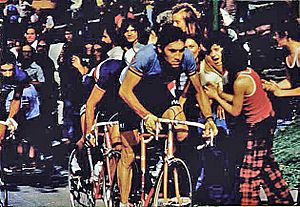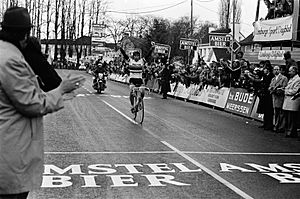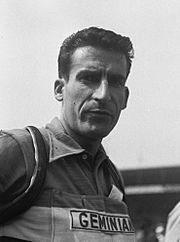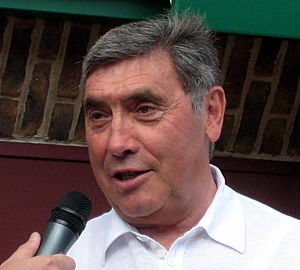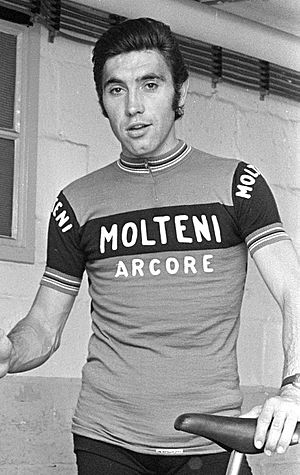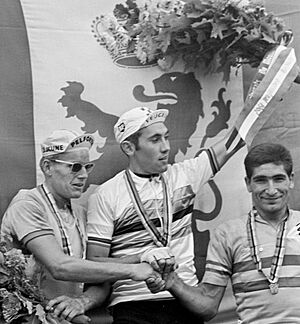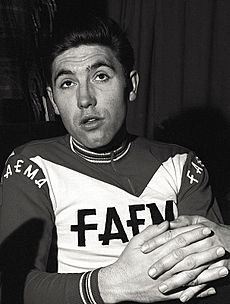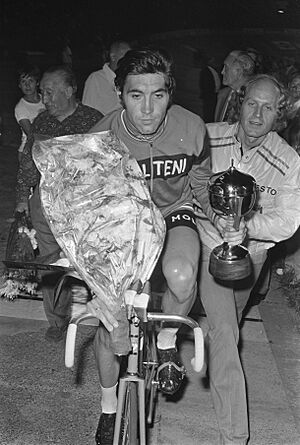Eddy Merckx facts for kids
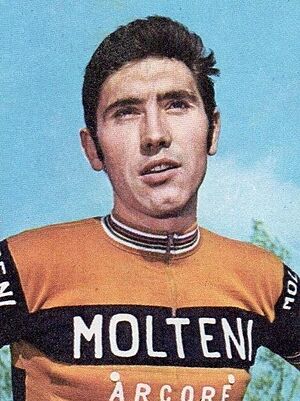
Merckx in 1971
|
|||
| Personal information | |||
|---|---|---|---|
| Full name | Édouard Louis Joseph Merckx | ||
| Nickname | Le Cannibale De Kannibaal (The Cannibal) |
||
| Born | 17 June 1945 Meensel-Kiezegem, Belgium |
||
| Height | 1.82 m (5 ft 11+1⁄2 in) | ||
| Weight | 74 kg (163 lb; 11 st 9 lb) | ||
| Team information | |||
| Current team | Retired | ||
| Discipline | Road and track | ||
| Role | Rider | ||
| Rider type | All-rounder | ||
| Major wins | |||
|
|||
Édouard Louis Joseph, Baron Merckx (born 17 June 1945), known as Eddy Merckx, is a Belgian former professional cyclist. Many people consider him the most successful rider in cycling history. He won an amazing eleven Grand Tours, including five Tours de France and five Giros d'Italia. He also won all five major one-day races called the Monuments. He even set the hour record and won three World Championships.
Eddy was born in Meensel-Kiezegem, Belgium. He grew up in Woluwe-Saint-Pierre where his parents ran a grocery store. He tried different sports but found his true love in cycling. Merckx got his first bicycle when he was very young. He competed in his first race in 1961 and won his first victory that same year.
After winning 80 races as an amateur, he became a professional cyclist in 1965. His first big win was the Milan–San Remo race a year later. He earned the nickname "the Cannibal" because he was so determined to win. A teammate's daughter gave him the name after her father said Merckx wouldn't let anyone else win. Eddy Merckx achieved 525 victories during his eighteen-year career. He is one of only three riders to have won all five 'Monuments' and the only one to win them all at least twice. He was great at both road and track cycling, and in both long stage races and shorter one-day races.
Since retiring from cycling in 1978, he has stayed involved in the sport. He started his own bicycle company, Eddy Merckx Cycles, in 1980. His bikes were used by many professional teams. Merckx also coached the Belgian national cycling team for eleven years. He helped create and organize the Tour of Qatar and the Tour of Oman races for many years.
Contents
- Eddy's Early Life and Amateur Races
- Becoming a Professional Cyclist
- Life After Racing
- Eddy's Personal Life
- Eddy Merckx's Amazing Legacy
- Race Rule Issues
- Awards and Honors
- Books About Eddy Merckx
- See also
Eddy's Early Life and Amateur Races
Eddy Merckx was born in Meensel-Kiezegem, Belgium, on June 17, 1945. He was the first child in his family. In 1946, his family moved to Woluwe-Saint-Pierre in Brussels to take over a grocery store. Eddy was a very active child and loved playing outside.
He was competitive and played many sports, like basketball and football. He even won some local boxing tournaments. But Eddy knew he wanted to be a cyclist from a young age. He started riding a bike at three or four years old. He would ride to school every day starting at age eight. Eddy would pretend to be his cycling hero, Stan Ockers, when riding with friends.
In 1961, Merckx got his first racing license. He competed in his first official race a month after turning sixteen. He finished sixth. He then won his first race in Petit-Enghien on October 1, 1961. He trained with former racer Félicien Vervaecke during the winter. Merckx won his second race in March 1962. He raced 55 times that year. As he spent more time cycling, his school grades dropped. After winning the Belgian amateur road race title, he left school. He ended the 1962 season with 23 victories.
Merckx won the amateur road race at the 1964 UCI Road World Championships in France. The next month, he finished twelfth in the individual road race at the 1964 Summer Olympics in Tokyo. Merckx remained an amateur until April 1965. He finished his amateur career with 80 wins.
Becoming a Professional Cyclist
Starting His Professional Career (1965–1967)
Eddy Merckx became a professional cyclist on April 29, 1965. He joined the Belgian team Solo. He won his first professional race in Vilvoorde. In August, he finished second in the Belgian national championships. This allowed him to race in the 1965 UCI Road World Championships.
Merckx decided to leave Solo because he felt his teammates, especially Rik Van Looy, treated him poorly. He said he didn't learn anything from them. He then signed with the French team Peugeot–BP–Michelin. With Solo, he had won nine races out of nearly 70.
First Big Wins and World Title
In March 1966, Merckx entered his first major professional stage race, the Paris–Nice. He led the race for one stage before finishing fourth overall. His next big event was Milan–San Remo, one of cycling's Monuments. He attacked on the final climb and won the sprint to the finish. In the following weeks, he raced the Tour of Flanders and Paris–Roubaix. He crashed in the first and had a flat tire in the second. He finished 1966 with 20 wins, including his first stage race win.
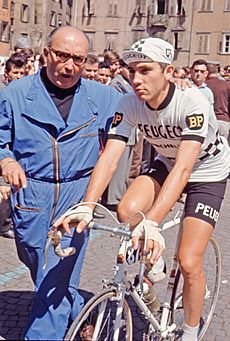
Merckx started 1967 with two stage wins. He then won the second stage of Paris–Nice and took the lead. He won the stage, helping his teammate Tom Simpson secure the overall victory. On March 18, Merckx won the Milan–San Remo for the second time in a row. He then won La Flèche Wallonne. In May, he started his first Grand Tour, the Giro d'Italia. He won two stages and finished ninth overall.
He signed with Faema in September 1967. He wanted more control over his racing. The next day, Merckx raced in the 1967 UCI Road World Championships in the Netherlands. He was part of a small group that broke away. He out-sprinted Jan Janssen to win first place. This made him the third rider to win both amateur and professional world titles. Winning this race meant he could wear the special rainbow jersey as world champion.
Dominating with Faema (1968–1970)
First Grand Tour Victory (1968)
Merckx's first win with his new team was a stage win. He had to quit Paris–Nice due to a knee injury. He didn't win Milan–San Remo or the Tour of Flanders that year. His next victory was at Paris–Roubaix, a tough race with bad weather. He beat Herman Van Springel in a race with many flat tires.
His team wanted him to race the Giro d'Italia. He won the second stage. The twelfth stage was rainy and had tough climbs. Merckx attacked and rode past everyone to win the stage and take the lead. He went on to win the entire race. He also won the points and mountains classifications. He finished 1968 with 32 wins.
Tour de France Glory and a Serious Crash (1969)
Merckx started 1969 with wins in smaller races and Paris–Nice. On March 30, he won his first Tour of Flanders. He attacked alone and rode to victory despite a flat tire. In the next 17 days, Merckx won nine more races. He won Milan–San Remo again and Liège–Bastogne–Liège.
He started the Giro d'Italia planning to race less aggressively. He won four stages and held the lead. However, before stage sixteen, he was told he had an issue with a race rule and was disqualified. The cycling organization later cleared him, saying he deserved the "benefit of the doubt."
Before the Tour de France, Merckx rested and trained. He won the sixth stage by attacking on a climb. During the seventeenth stage, he attacked on the Col du Tourmalet. He rode alone for a long time, increasing his lead. He suffered from low blood sugar but kept going. He finished the stage in great pain. Merckx won six stages in the Tour. He also won the overall, points, mountains, and combination classifications. He was named the most aggressive rider.
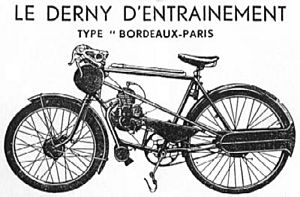
In September, Merckx was in a track event in Blois. He was being paced by Fernand Wambst. Another pacer crashed, and Wambst tried to avoid it. But they collided, and Merckx's pedal got caught. Both riders fell hard. Wambst sadly died from a head injury. Merckx was unconscious for 45 minutes. He had a concussion, whiplash, and a displaced pelvis. He said he "was never the same again" after the crash. He often adjusted his seat during races to help with the pain.
Winning Both Giro and Tour (1970)
Merckx started 1970 with a mild knee injury. He won Paris–Nice, taking the overall title and three stages. He then won the Gent–Wevelgem and the Tour of Belgium. He also won Paris–Roubaix by over five minutes, the largest winning margin in the race's history. He then won La Flèche Wallonne.
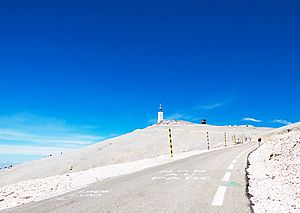
Merckx was hesitant to return to the Giro d'Italia after the previous year's issue. He agreed to race only if all rule checks were done in a specific lab. He won the second stage. Despite some weakness in the mountains, he attacked on a climb to win stage seven and take the lead. He won the stage nine time trial by almost two minutes. He held his lead until the end, winning his second Giro.
Before the Tour, Merckx won the Belgian national road race title. He won the Tour's opening prologue, taking the yellow jersey. He regained the lead in stage six. He won the stage nine time trial and the first mountain stage, stage 10. He won three more stages, including a tough climb to Mont Ventoux, where he needed oxygen at the finish. Merckx won two more time trials and the Tour by over twelve minutes. He finished with eight stage wins, equaling a record. He also won the mountains and combination classifications. He became the third rider to win both the Giro and Tour in the same year.
The Molteni Years (1971–1976)
Third Tour Win and Second World Title (1971)
Merckx joined the Italian team Molteni in 1971. He won the Giro di Sardegna by attacking alone. He then won Paris–Nice for the third time in a row. In Milan–San Remo, he attacked on the Poggio climb and won his fourth title there. Six days later, he won the Omloop Het Volk.

His rivals worked against him in the Tour of Flanders. He had five flat tires in Paris–Roubaix. The Liège–Bastogne–Liège was cold and rainy. Merckx attacked far from the finish, caught the leaders, and won the sprint. Instead of the Giro, he raced two shorter French races, both of which he won.
The Tour de France started with a team time trial that Merckx's team won. He lost and regained the lead early on. In stage two, a big group with Merckx broke away and finished nine minutes ahead. After a week, Merckx had a small lead. In stage eight, on a mountain finish, Luis Ocaña gained time on him.
On a descent in stage nine, Merckx had a flat tire. Ocaña and others attacked, gaining a minute and a half. The next day, Merckx lost eight minutes due to stomach pains. In stage eleven, Merckx and some teammates formed a breakaway, gaining two minutes. He won the next time trial, gaining more time. In the Pyrenees, during a stormy stage, Merckx crashed on a descent. Ocaña, who was behind him, crashed in the same spot and had to leave the race due to injuries. Merckx took the lead. He won two more stages and the overall, points, and combination classifications.
Seven weeks after the Tour, Merckx raced in the 1971 UCI Road World Championships in Switzerland. He was part of a five-man breakaway. He attacked and won the race, earning his second rainbow jersey. He ended 1971 with his first win in the Giro di Lombardia. This meant he had won all of cycling's Monuments. During the off-season, he had his displaced pelvis treated.
Breaking the Hour Record (1972)

Merckx started 1972 not as strong as before. In Paris–Nice, he broke a vertebra in a crash. He continued to race despite doctor's advice. He won a stage by sprinting away from Ocaña. He lost the overall lead in the final stage to Raymond Poulidor. Two days later, Merckx won Milan–San Remo for the fifth time.
He crashed again in Paris–Roubaix, making his injury worse. He won Liège–Bastogne–Liège by riding alone for a long distance. Three days later, he won La Flèche Wallonne. He became the third rider to win both races in the same weekend. He chose to race the Giro d'Italia instead of the Vuelta a España.
Merckx lost time early in the Giro to José Manuel Fuente. But in stage seven, Fuente struggled, and Merckx caught and passed him, taking the lead. He expanded his lead in time trials. Fuente attacked again, but Merckx caught him and won stage fourteen. He won one more stage and his third Giro d'Italia.
Merckx entered the Tour de France expecting a big battle with Ocaña. He won the opening prologue. In stage seven, Ocaña had a flat tire on a climb. Merckx and others attacked. Ocaña crashed and lost almost two minutes. Merckx was criticized for attacking, but he pointed out Ocaña had done the same in the past. Merckx won the next stage, regaining the lead. He won three more stages and the Tour, completing his second Giro-Tour double.
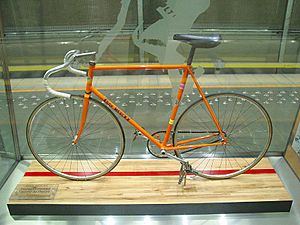
In October 1972, Merckx decided to try to break the hour record. This attempt took place in Mexico City, Mexico, because the high altitude meant less air resistance. He started fast but then slowed down. He recovered and set a new world record of 49.431 kilometers. He said the pain was "very, very, very significant."
Winning Giro and Vuelta (1973)
Merckx missed Milan–San Remo in 1973 due to illness. Over 19 days, he won four major races, including Omloop Het Volk, Liège–Bastogne–Liège, and Paris–Roubaix. He decided to race the Vuelta a España and the Giro d'Italia instead of the Tour de France. He won the opening part of the Vuelta and took an early lead. He won six stages and his only Vuelta a España title. He also won the points and combination classifications.
Four days after the Vuelta, Merckx started the Giro d'Italia. He won the opening team time trial and the next day's stage. His main rival, Fuente, lost a lot of time early on. Merckx won stage eight despite Fuente's attacks. Fuente tried to attack throughout the rest of the race but only gained time on the second-to-last stage. Merckx won the race, leading from start to finish. He was the first rider to win both the Giro and Vuelta in the same year.
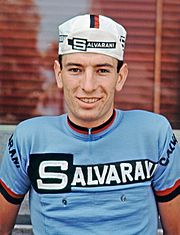
The 1973 UCI Road World Championships were held in Spain. In the road race, Merckx attacked with about 100 kilometers left. Three other riders, including Felice Gimondi, followed him. Merckx attacked again on the final lap, but they caught him. In the final sprint, Merckx finished last of the four, and Gimondi won. After the world championships, Merckx won his first Paris–Brussels and Grand Prix des Nations. He also won the Giro di Lombardia, but was later disqualified due to a testing issue. He ended the season with over 50 victories.
Achieving Cycling's Triple Crown (1974)
In 1974, Merckx did not win a spring classic for the first time. This was partly because he was sick. He had pneumonia and had to stop racing for a month. This meant he started the Giro d'Italia not in his best shape. He lost time early to Fuente. Merckx gained time in the race's only time trial. Two days later, he attacked far from the finish in bad weather. Fuente lost ten minutes, and Merckx became the race leader. In the twentieth stage, Fuente and Gianbattista Baronchelli attacked on a climb. Merckx couldn't match them, and his lead shrunk to twelve seconds. He held on to win his fifth Giro d'Italia.
Three days after the Giro, Merckx started the Tour de Suisse. He won the opening part and rode carefully. He won the final time trial to secure the overall victory. After the race, Merckx had a small surgery. Five days later, he was scheduled to start the Tour de France. The wound was still open and bled during the race.
At the Tour, Merckx won the opening prologue, taking the first yellow jersey. He won the seventh stage by attacking near the end. He gained five minutes on his main rival, Poulidor, on a climb. The next day, on Mont Ventoux, Merckx rode to limit his losses against attacks from other riders. He expanded his lead with several more stage wins. He won eight stages and his fifth Tour de France, equaling the record.
Merckx led the Belgian team at the 1974 UCI Road World Championships. The course was hilly. Merckx and Poulidor attacked near the end. They rode to the finish together, and Merckx won the sprint. By winning this race, Merckx became the first rider to achieve the Triple Crown of Cycling. This means winning the Tour de France, Giro d'Italia, and the World Championships in the same year. It was also his third world title.
Second Place at the Tour (1975)
Merckx started 1975 well, winning Milan–San Remo and Amstel Gold Race. He also won the Setmana Catalana de Ciclisme. In the Catalan Week, his important teammate Joseph Bruyère broke his leg. Two days later, Merckx raced the Tour of Flanders. He attacked far from the finish and rode alone to win his third Tour of Flanders. In Paris–Roubaix, he had a flat tire but caught the leaders and finished with them. He won his fifth Liège–Bastogne–Liège by attacking many times.
Merckx's racing style changed. Other riders expected him to chase attacks, which made him angry. He caught a cold and tonsillitis, which affected his performance. He was in poor shape and did not race the Giro d'Italia. He finished second in the Tour de Suisse.
He placed second in the Tour de France's opening part. He gained time on his rivals in early stages and won two time trials. During stage eleven, he pushed his team to set a fast pace. On the final climb, he couldn't follow an attack by Bernard Thévenet and lost over two minutes. After that stage, Merckx decided to focus on marking Thevenet.
While climbing the Puy-de-Dôme, Merckx was punched in the back by a spectator. He finished the stage 34 seconds behind Thevenet and felt very sick. The punch left a large bruise. He was later found to have an inflamed liver. In the next stage, Merckx felt pain from the punch. He struggled on the final climb, and Thevenet passed him. Merckx finished fifth, losing more time. He crashed in the next stage, breaking a cheekbone. He finished second overall, the first time he had lost a Tour he started.
Record Seventh Milan–San Remo (1976)
Merckx started 1976 by winning his record seventh Milan–San Remo. He also won the Catalan Week, but crashed in the final stage, injuring his elbow. This injury affected his performance in spring races. He raced the Giro d'Italia but did not win any stages for the first time. He finished eighth overall. After the Giro, Merckx announced he would not race the Tour de France. He finished fifth in the 1976 UCI Road World Championships. He ended his season in October. He did not win the Super Prestige Pernod International, a points competition, for the first time since 1968. His team, Molteni, ended their sponsorship at the end of the season.
Final Years of Racing (1977–1978)
Fiat France became Merckx's new team sponsor. He won his first races of the season in smaller events. Merckx planned a lighter spring season to save energy for a chance at a sixth Tour victory. He won one stage at Paris–Nice but had to leave the race due to sinusitis. He did not win any spring classics, with his best finish being sixth place. Before the Tour, he raced two other stage races.
He felt anxious about his form and old injuries before the Tour de France. He held second place overall for two weeks. As the race entered the Alps, Merckx started to lose time. He lost thirteen minutes on the stage to Alpe d'Huez. He finished the Tour in sixth place. After the Tour, Merckx raced many times. He finished 33rd at the 1977 UCI Road World Championships. His last victory on the road was in September in a local race. In late December, Fiat France decided to stop sponsoring Merckx.
In January 1978, a department store called C&A announced they would sponsor a new team for Merckx. His plan was to race one last Tour de France and then some smaller races. He raced only five times in 1978. His last victory was in a track event in February. His first road race was in February, where he quit early. He finished fifth in another race. He dropped out of a race due to colitis. He completed his final race on March 19. After a vacation, Merckx announced his retirement from cycling on May 18. He said doctors advised him not to race anymore.
Life After Racing
Script error: The function "" does not exist. After retiring, Merckx opened Eddy Merckx Cycles in Brussels in 1980. The company became well-known and successful. Many top cycling teams used his bikes in the 1980s and 1990s. Merckx stepped down as CEO in 2008 but still helped test the bikes. As of January 2015, the company is still in Belgium and sells bikes to over 25 countries.
Merckx managed the Belgian national cycling team for eleven years, from 1986 to 1996. He also helped organize the Grand Prix Eddy Merckx race. He played a big part in starting the Tour of Qatar in 2002. He helped plan the race and organize it until it was canceled in 2017. He also helped Qatar host the 2016 UCI Road World Championships. Merckx also helped start the Tour of Oman in 2010. He has said that even though he doesn't race, he will always be involved with cycling.
Eddy's Personal Life
Merckx started dating Claudine Acou in 1965. She was a teacher and the daughter of the national amateur team's trainer. They married on December 5, 1967. Claudine often spoke to the press for her shy husband. They had their first child, Sabrina, in 1970. Their son, Axel, also became a professional cyclist. Merckx grew up speaking Flemish but learned French in school.
In 1996, the King of the Belgians gave him the title of baron. In Italy, he was given the title of Cavaliere. In 2011, the French President gave him a high honor, the Commandeur de la Légion d'honneur. Merckx is an ambassador for the Damien The Leper Society, which helps fight diseases in developing countries. He is also an art lover.
In 2013, Merckx received a pacemaker to help with a heart rhythm issue. This was a preventative measure. He said he never had heart problems while racing, even though some men in his family died young from heart issues. In 2004, he had an esophagus operation for stomach aches he had since he was young. He lost a lot of weight after the procedure. In October 2019, Merckx was hospitalized after a cycling accident. He had a hemorrhage and was unconscious for a while but was released a week later.
In December 2024, Merckx crashed again while cycling and fractured his hip. He needed a full hip replacement.
Eddy Merckx's Amazing Legacy
Many people believe Eddy Merckx is the greatest and most successful cyclist ever. He was excellent in both Grand Tours and one-day classic races. He was also a very strong time trialist and climber. Plus, he showed great skill in track cycling. He was known for his attacking style of racing, which was called la course en tête ("the race in the lead"). He would often break away from the main group and keep pushing hard.
Merckx raced in over 1,800 events during his career and won a total of 525. Because he was so dominant, some cycling historians call the time he raced the "Merckx Era." Between 1967 and 1977, he raced between 111 and 151 times each season. In 1971, he raced 120 times and won 54 of them, which is the most wins any cyclist has had in a single season. Merckx agrees he was the best of his time, but he says it's hard to compare riders from different generations. Because cyclists today specialize more, it's unlikely anyone will ever beat his number of road race victories.
Merckx is one of only three riders to win all five 'Monuments of Cycling'. These are the Milan–San Remo, Tour of Flanders, Paris–Roubaix, Liège–Bastogne–Liège, and the Giro di Lombardia. The other two riders are Rik Van Looy and Roger De Vlaeminck. Merckx finished his career with 19 victories across these Monuments, which is more than any other rider. He won 28 classic races in total. The only major classic he didn't win was Paris–Tours.
He was the third rider to win all three Grand Tours in his career. He holds the record for most Grand Tour victories with 11. He also has the record for most stage wins across all three Grand Tours with 64. He has completed the most Giro-Tour doubles in history, doing it three times. He was the first rider to win cycling's Triple Crown in 1974. This feat has only been achieved two other times, by Stephen Roche in 1987 and Tadej Pogačar in 2024. He is the only rider to win the overall, points, and mountains classifications in both the Giro d'Italia (1968) and the Tour de France (1969). He shares the record for most victories at both the Giro d'Italia and Tour de France, with five wins at each. He also holds the records for most days spent in the race leader's jersey in these races. For his success in the Giro d'Italia, Merckx was the first rider inducted into the race's Hall of Fame in 2012. At the Tour de France, he is just behind Mark Cavendish for the most stage wins in a career. The start of the 2019 Tour de France was held in Brussels, Belgium, to honor Merckx's first Tour de France win in 1969.
His nickname "The Cannibal" came from the daughter of his teammate, Christian Raymond. Raymond had said Merckx wouldn't let anyone else win, and his daughter called Merckx a cannibal. Raymond liked the name and told the press. In Italy, he was known as il mostro ("the Monster").
Dutch cyclist Joop Zoetemelk once said, "First there was Merckx, and then another classification began behind him." Cycling journalist Phil Liggett wrote that if Merckx started a race, many riders knew they would likely be competing for second place. Eddy Merckx was criticized by some riders for always wanting to win, which meant even lesser-known riders couldn't get a few victories. When told he won too much, Merckx said, "The day when I start a race without intending to win it, I won't be able to look at myself in the mirror."
Records and Achievements
Grand Tour Records
- Most Grand Tour wins: 11
- Most consecutive Grand Tours wins: 4 (1972 Giro d'Italia, 1972 Tour de France, 1973 Vuelta a España & 1973 Giro d'Italia)
- Most Grand Tour stage wins: 64
- Most Tour de France wins: 5 (1969, 1970, 1971, 1972 & 1974) – shared record
- Most stage wins in 1 Tour de France: 8 in 1970 – shared record
- Most days in Tour de France yellow jersey
 : 96
: 96 - First winner of all 3 specialties in 1 Tour de France (mountain, sprint, and individual time trial) in 1974
- The only winner of the overall, points, and mountains classifications in the Tour de France: 1969
- Most Tour de France combativity awards
 : 4 (1969, 1970, 1974 & 1975)
: 4 (1969, 1970, 1974 & 1975) - Most Giro d'Italia wins: 5 (1968, 1970, 1972, 1973 & 1974) – shared record
- Most days in Giro d'Italia pink jersey
 : 78
: 78 - The only winner of the overall, points, and mountains classifications in the Giro d'Italia: 1968
Classic Race Records
- Winner of all 5 Monuments of Cycling – shared record
- Most victories in all Monuments: 19
- The only winner of 3 Monuments in 1 year: 4 times (1969, 1971, 1972 & 1975)
- The only cyclist to win all 5 Monuments more than once
- Most victories in classic races: 28
- Most victories in a single classic: 7 in Milan–San Remo (1966, 1967, 1969, 1971, 1972, 1975 & 1976)
- Most Liège–Bastogne–Liège wins: 5 (1969, 1971, 1972, 1973 & 1975)
- Most Gent–Wevelgem wins: 3 (1967, 1970 & 1973) – shared record
Other Notable Records
- Most road races won by a professional cyclist: 525
- Most road races won in 1 season: 54 (out of 120 races) in 1971
- UCI World hour record
: 1972
- Most UCI World Road Championships
 : 3 (1967, 1971 & 1974) – shared record
: 3 (1967, 1971 & 1974) – shared record - Triple Crown of Cycling winner: 1974 – shared record
- Monument winner, Grand Tour winner and UCI World Champion in 1 year: 1971 – shared record
- Most Super Prestige Pernod wins: 7 (1969, 1970, 1971, 1972, 1973, 1974 & 1975)
- Most Escalada a Montjuïc wins: 6 (1966, 1970, 1971, 1972, 1974 & 1975)
- Most Giro di Sardegna wins: 4 (1968, 1971, 1973 & 1975)
- Most Setmana Catalana de Ciclisme wins: 2 (1975 and 1976) – shared record
World Hour Record
| Discipline | Record | Date | Event | Velodrome | Ref |
|---|---|---|---|---|---|
| Hour record | 49.431 km | 25 October 1972 | — | Agustín Melgar Olympic Velodrome, Mexico City |
Race Rule Issues
Merckx was leading the 1969 Giro d'Italia. After a stage, he underwent a routine test. His test showed an issue, and a second test also had the same result. The news was announced before Merckx or his team were told. This meant Merckx was to be suspended for a month. The race director tried to delay the next stage, but Merckx was disqualified. However, a few days later, the cycling organization removed the suspension.
Merckx always said he was innocent. He argued that his samples might have been handled incorrectly. Many international news outlets believed him. They thought it didn't make sense for him to use banned substances when he had such a big lead.
In November 1973, it was announced that Merckx had another testing issue after winning the Giro di Lombardia. He had a second test done, which also showed an issue. The substance was in a cough medicine prescribed by his team doctor. Merckx was disqualified from the race, and the win was given to the second-place finisher, Felice Gimondi. Merckx was also suspended for a month and fined. He admitted he took the medicine but said the name of the substance wasn't on the bottle. The substance was later removed from the list of banned items.
In May 1977, Merckx and several other riders had testing issues at La Flèche Wallonne. They were fined and suspended for one month by the Belgian cycling federation. Merckx initially planned to appeal, saying he only took substances not on the banned list. His eighth-place finish in the race was removed. Years later, Merckx said he did take a banned substance, admitting he was wrong to trust a doctor.
Because of these testing issues during his career, Merckx was asked by organizers to stay away from the 2007 UCI Road World Championships in Germany. The organizers said they "had to be role models."
Awards and Honors
Special Titles
 Knight of the French Legion of Honour: 1975
Knight of the French Legion of Honour: 1975 Officer in the Belgian Order of Leopold II: 1996
Officer in the Belgian Order of Leopold II: 1996 Commander of the French Legion of Honour: 2014
Commander of the French Legion of Honour: 2014 Knight in the Order of Merit of the Italian Republic
Knight in the Order of Merit of the Italian Republic Silver Olympic Order: 1995
Silver Olympic Order: 1995- Given the title of Baron by the King of Belgium: 1996
- Honorary doctorate from the VUB university: 2011
- Belgian Olympic and Interfederal Committee Order of Merit: 2013
- Merckx is an honorary citizen of Meise, Tielt-Winge and Tervuren
- Bronze Zinneke: 2006
Sports Awards
- Belgian National Sports Merit Award: 1967
- Belgian Sportsman of the Year: 1969, 1970, 1971, 1972, 1973, 1974
- Tour de France Overall Combativity award: 1969, 1970, 1974, 1975
- PAP European Sportsperson of the Year: 1969, 1970
- Worldwide Sportsman of the Year: 1969, 1971, 1974
- Mendrisio d'Or: 1972, 2011
- Belgian Sportsman of the 20th Century: 1999
- UCI Cyclist of the 20th Century: 2000
- Marca Legend: 2000
- Introduced into the UCI Hall of Fame: 2002
- First Member of the Giro Hall of Fame: 2012
- L'Équipe Trophée Champion des Champions de Légende: 2014
- Rouleur Hall of Fame: 2018
- Velonews The Greatest Cyclists of All Time (1st place): 2019
- Wiggle The Best Cyclists Ever Rank (1st place): 2020
- Eurosport Greatest General Classification Cyclist of all Time: 2020
- Vélo d'Or honorary award: 2023
- ESPN Lifetime Achievement Award: 2025
Places and Statues Honoring Eddy
Script error: The function "" does not exist.
- Monument in Stavelot: 1993
- Vélodrome Eddy Merckx, Mourenx: 1999
- Eddy Merckx metro station, Brussels: 2003
- Sports complex, Vlaams Wielercentrum Eddy Merckx, Gent: 2006
- Monument in Meise: 2015
- Statue in Meensel-Kiezegem: 2015
- Square Eddy Merckx in Sint-Pieters-Woluwe: 2019
- Monument in Petit-Enghien: 2023
Events and Awards Named After Eddy
- Golden Bike Eddy Merckx: a cycle race for young riders from 1983 to 2008
- Grand Prix Eddy Merckx: a professional cycle race from 1980 to 2004
- Start of the 2019 Tour de France in Brussels in honor of Eddy Merckx
- Since 2023, the Vélo d'Or "Eddy Merckx trophy" is awarded to the best classics cyclist.
Books About Eddy Merckx
- The Champion Eddy Merckx by Claude le Boul in 1987
- Eddy Merckx: The Greatest Cyclist of the 20th Century by Rik Vanwalleghem and Steven Hawkins in 1996
- Eddy Merckx 525 by Frederik Backelandt & Karl Vannieuwkerke in 2012
- Merckx 69: Celebrating the World's Greatest Cyclist in his Finest Year by Tonny Strouken and Jan Maes in 2015
- The Dream of Eddy Merckx by Freddy Merckx in 2019
- De Rivals of Merckx by Filip Osselaer in 2019
- 1969 – The Year of Eddy Merckx by Johny Vansevenant in 2019
- Eddy Merckx: Biography Story for Kids by Willie M. Mone in 2024
- Eddy Merckx Biography: The Cannibal's Unstoppable Ride by W Alvin M. James in 2024
See also
 In Spanish: Eddy Merckx para niños
In Spanish: Eddy Merckx para niños
- Cycling records
- Yellow jersey statistics
- Pink jersey statistics
- List of Giro d'Italia general classification winners
- List of Grand Tour general classification winners
- List of Tour de France general classification winners
- List of Tour de France secondary classification winners
- List of Vuelta a España general classification winners
- List of Vuelta a España classification winners
 | Toni Morrison |
 | Barack Obama |
 | Martin Luther King Jr. |
 | Ralph Bunche |


